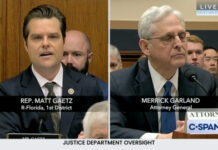Since Liberty Counsel’s unanimous victory at the U.S. Supreme Court in Shurtleff v. City of Boston in 2022 where Boston illegally censored Christian viewpoints by denying flying the Christian flag in a public forum open to “all applicants,” the ruling has continued to have a ripple effect throughout the nation regarding flag policies.
Many city governments now are choosing not to make the mistake of favoring one group over another.
In Clearwater, Florida, Mayor Bruce Rector stated that the city will host events and a proclamation for “pride month” but have ended the practice of switching out the city flag at the downtown Municipal Services Building. Rector said that it could create “a slippery slope” with the city making judgment calls on groups that may “ask for the gesture in the future.”
The city council banned the “pride flag” in Hamtramck, Michigan on public property after debate on LGBTQ+ discrimination and religion due to the “beliefs of some members of their faith.” The council voted to display only five flags: the American Flag, the Michigan flag, and the countries of immigrant residents.
In Downey, California, the city council voted 3-2 to adopt a “neutral” flag policy allowing only the United States flag, the state flag, the city flag, and the POW/MIA flag.
Even though Huntington Beach, California had previously flown the rainbow flag during “Pride month” during the last two years, voters approved a measure that restricts all non-government flags from being flown on city property and only allows that the American flag, the State of California flag, the County of Orange flag, the City of Huntington Beach flag, the POW-MIA flag, the six Armed Forces flags and the Olympic flag during the Summer Olympic Games may be flown on government flagpoles.
Mayor Randy Taylor of Salisbury, Maryland decided against the city taking part in raising a rainbow flag, an annual tradition marking the start of “Pride month.” Taylor stated the decision was based on being “fair” and “transparent.” He said, “Neutrality is not to be interpreted as anything else but simply that — being neutral.”
In Boonton, New Jersey, the city council recently approved an ordinance which significantly restricts the types of flags permitted to fly over municipal property. Under the new rules, only the American flag, state and county flags, and military flags or Prisoner of War/Missing in Action flags are allowed.
The city council in Dover, New Jersey also recently voted to restrict flags on city property to just the U.S. flag, state and POW-MIA flags. Major James Dodd stated the city wanted to avoid having to “pick and choose” which community organizations would be permitted to fly flags above Town Hall.
In Enfield, Connecticut, the town council voted 6-5 last January to only allow the American flag, Connecticut state flag, POW/MIA flag, and military branch flags. The interim town’s attorney, Tom Tyler, said the decision protects the town from unnecessary lawsuits from organizations or individuals wanting to fly flags on town owned property and forbids town flagpoles from being used as public forums of free speech.
In Shurtleff v. City of Boston, the High Court stated because the government admitted it censored the Christian flag because it was referred to as a Christian flag on the application, the censorship was viewpoint discrimination, and therefore the government was not taking part in establishing a religion by flying the flag.
The Supreme Court’s decision in Shurtleff focused in part on “government speech” and “ownership of expression.” The ruling stated that when the government opens a forum for expression to the public (such as a flagpole), then the First Amendment prevents viewpoint discrimination.
The Shurtleff and Coach Kennedy cases resulted in the Supreme Court overturning the 1971 Lemon v. Kurtzman case, which for 51 years distorted the First Amendment Establishment, Free Exercise, and Free Speech Clauses.
Liberty Counsel’s Founder and Chairman Mat Staver said, “The clear message from the Supreme Court is that government cannot favor one viewpoint and censor another. To avoid litigation and an unfavorable ruling like the City of Boston received, governments should stick with government flags. If they veer away from government flags, be warned that viewpoint censorship can be a costly mistake.”
For more information on Shurtleff v. City of Boston, visit www.LC.org/flag.
















